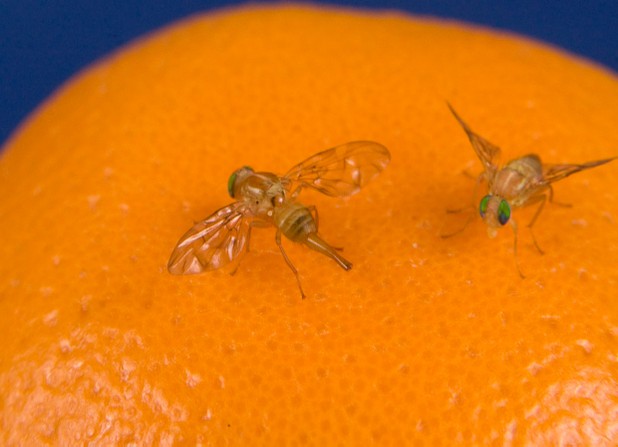- Story Highlights
-
- Sexual Frustration and Drinking: Fruit flies denied sex drank way more than sexually fulfilled flies
- Neuropeptide F: Differences in this chemical likely explain the differing behaviors. Humans also make use of a very similar neuropeptide.
Sexually Deprived Fruit Flies Drink More Alcohol
Male fruit flies that couldn't get any sex drink far more alcohol than sexually satisfied male fruit flies. Researchers say that variations in levels of a chemical called neuropeptide F explain the difference and that humans also make use of a very similar brain chemical.
Researchers at The University of California, San Francisco say that sexually frustrated fruit flies drink more alcohol – and that the results of their experiments might help to explain why some people drink to excess.
The Experiment
A group of male fruit flies were separated into 2 study groups. One group of male fruit flies entered an environment full of ready to copulate virgin female fruit flies and the other group of flies entered an environment with female fruit flies that had already copulated and would not do so again.
After a few days, the fruit flies in both groups were given access to two different types of food: one food mash containing alcohol and one food mash without alcohol. Fruit flies normally enjoy consuming alcohol.
The Results
- The sexually frustrated fruit flies preferred the alcohol laden food
- The sexually fulfilled fruit flies spurned the alcohol laden food and consumed only non-alcoholic food
Commentary
The researchers say that compared to the sexually fulfilled flies, the sexually deprived fruit flies had half the amount of a chemical called neuropeptide F and that this differential likely explains why one group preferred to drink alcohol and the other group did not.
Humans do not use neuropeptide F but we do use a very similar substance called neuropeptide Y. Because of this, the researchers suggest that neuropeptide levels may play a role in substance abuse and addiction.
The full research results can be found in the journal, Science.


